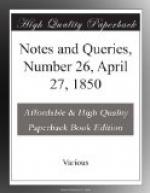2. The Trumpet of Fame; or Sir Francis Drake’s and Sir John Hawkin’s Farewell: with an encouragement to all Sailors and Souldiers that are minded to go in this worthie enterprise, &c. 12mo. London, by T. Creede, 1595.
This poetical tract is of the greatest rarity, and was unknown to Ames, Herbert, Warton and Ritson. A MS. note, in a contemporary hand, says the author was one Henry Roberts, whose initials are appended to the work.
3. The Mastive, or Young Whelpe of the Olde Dogge. Epigrams and Satyrs, by H.P. 4to. London, by T. Creede, circa 1600.
As an Epigram in this collection also appears in Henry Peacham’s Minerva Britanna, with a slight variation, it is fair to surmise that he was the author of this very rare volume, in preference to Henry Parrott.
4. Pasquil’s Jests, mixed with Mother Bunch’s Merriments. Whereunto is added a dozen of Gulles. Pretty and pleasant to drive away the tediousnesse of a winter’s evening. 4to. 1608.
In the British Bibliographer, vol i., may be seen an account of the edition of 1609, with extracts from it, and a statement that “an earlier edition is without the Gulls.” The present copy (which passed through my hands some years ago), although earlier, has the Gulls.
5. Holie Historie of our Lord and Saviour Jesus Christ’s Nativitie, Life, Actes, Miracles, Doctrine, Death, Passion, Resurrection, and Ascension. Gathered into English Meeter, and published to withdraw all vajne wits from all unsaverie and wicked rimes and fables &c. 12mo. London, by R. Field, 1594.
Ames and Herbert say this book was written by Henry Holland; but the author’s name {414} was Robert Holland. It is not mentioned by Warton.
6. News from the Stars; or, Erra Pater’s Ghost, by Meriton Latroon. 12mo. 1673.
“Richard Head, a broken bookseller, and the author of the English Rogue, writ this. He turned Papist, and in his voyage to Spain was drowned.”—MS. note in a contemporary hand.
Edward F. Rimbault.
* * * * *
POPE, PETRONIUS, AND HIS TRANSLATORS.
The vindication of Pope from the charge of borrowing his well-known sentiment—“Worth makes a man,” &c.—from Petronius, is not so completely made out by “P.C.S.S.” as it might be; for surely there is a sufficient similitude of idea, if not of expression, between the couplet of Pope and the sentence of Petronius, as given in all four of the translations cited by him (No. 23. p. 362.)—“The heart makes the man,” &c.—to warrant a notion that the one was suggested by the other. But the surmise of plagiarism originates in a misconception of the terms employed by the Latin author—virtus, frugalitas, and more especially corcillum,—which have been misunderstood by every one of these translators. Virtus is applied to mental as well as bodily




